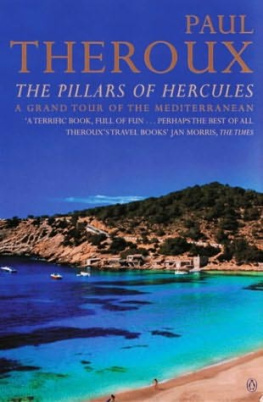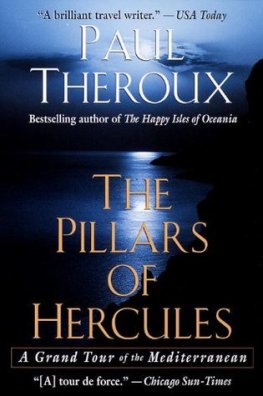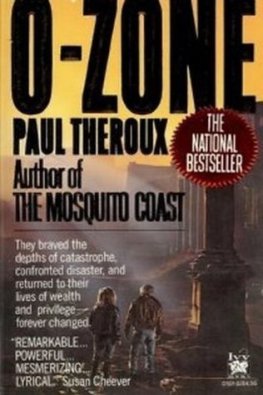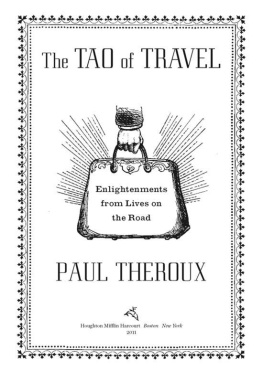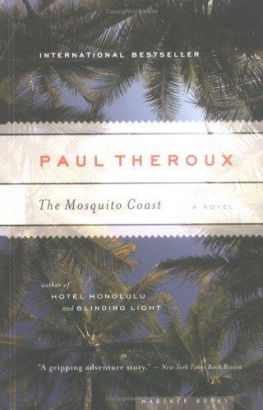By the Same Author
FICTION
Waldo
Fong and the Indians
Girls at Play
Jungle Lovers
Sinning with Annie
Saint Jack
The Black House
The Family Arsenal
The Consuls File
A Christmas Card
Picture Palace
Londom Snow
Worlds End
The Mosquito Coast
The London Embassy
Half Moon Street
O-Zone
My Secret History
Chicago Loop
Millroy the Magician
My Other Life
Kowloon Tong
Hotel Honolulu
CRITICISM
V. S. Naipaul
NONFICTION
The Great Railway Bazaar
The Old Patagonian Express
The Kingdom by the Sea
Sailing Through China
Sunrise with Seamonsters
The Imperial Way
Riding the Iron Rooster
To the Ends of the Earth
The Happy Isles of Oceania
Fresh Air Fiend
Sir Vidias Shadow
About the Author
P AUL T HEROUX was born in Medford, Massachusetts, in 1941 and published his first novel, Waldo, in 1967. His subsequent novels include The Black House, The Family Arsenal, Picture Palace (winner of the Whitbread Prize for fiction), O-Zone, The Mosquito Coast, which was made into a hit movie starring Harrison Ford, the critically acclaimed My Secret History, and Chicago Loop. His bestselling and highly successful travel books include The Great Railway Bazaar, The Old Patagonian Express, Riding the Iron Rooster, To the Ends of the Earth, and The Happy Isles of Oceania.
1
The Cable Car to the Rock of Gibraltar
P eople here in Western Civilization say that tourists are no different from apes, but on the Rock of Gibraltar, one of the Pillars of Hercules, I saw both tourists and apes together, and I learned to tell them apart. I had traveled past clumps of runty stunted trees and ugly houses (the person who just muttered, Oh, there he goes again! must read no further) to the heights of the Rock in a metal box suspended by a cable. Gibraltar is just a conspicuous pile of limestone, to which distance lends enchantment; a very small number of people cling to its lower slopes. Most of them are swarthy and bilingual, speaking intelligible English, and Spanish with an Andalusian accent. Mention Spain to them and they become very agitated, though they know that as sure as eggs are huevos the British will eventually hand them over to the King of Spain, just as they chucked Hong Kong into the horny hands of the dictator of China.
The Rock Apes of Gibraltar are Barbary macaques (Macaca sylvanus), the only native apes in Europe. The apes are still resident, and have lived there longer than most Gibraltarian families. There is a social order among the ape tribes, as well as ape rituals that are bizarre enough to be human. Ape corpses and skeletons are never found on the Rock. Somewhere in the recesses of this rock that looks like a mountain range there is said to be a secret mortuary established by the apes; ape funerals, ape mourning, ape burials. The apes are well established, but disadvantagedunemployed, unwaged, destitute welfare recipients. The municipal government allocates money to feed them.
But there might be darker motive in this food aid. A powerful superstition, held by locals, suggests that if the apes vanish from Gibraltar, the Rock will cease to be British. For hundreds of yearssince 1740, in factthe apes have been mentioned by travelersGrand Tourists, in whose footsteps I was following. Yet Gibraltar has been visited almost since Hercules, patron of human toil, flung it there on his journey to capture the Red Oxen of Geryones, the monster with three bodies (Labor Ten). He tossed another rock across the straits, Ceuta in Morocco. These two promontories, Cape and Abya to the Greeksthe Mediterranean bottleneckare the twin Pillars of Hercules.
My idea was to travel from one pillar to the other, the long way, with the usual improvisations en route that are required of the impulsive traveler; all around the Mediterranean coast, the shores of light.
The grand object of traveling is to see the shores of the Mediterranean, Dr. Johnson said. On those shores were the four great Empires of the world; the Assyrian, the Persian, the Grecian, and the Roman. All our religion, almost all our law, almost all our arts, almost all that sets us above savages, has come to us from the shores of the Mediterranean.
Our of course is as questionable as savages, but you get the idea. A great deal happened on this coastline. It was not until the second century B . C . that the Romans sailed through the Pillars of Hercules. The reason for this late, if not timid, penetration of the straits was not the current, nor was it the inconvenient westerlies that blow through this narrow opening of the inland sea; it was the Mediterranean notion that nothing lay beyond the pillars except the Garden of the Hesperides and the lost continent of Atlantis, and hellish seas.
The pillars marked the limits of civilization, the end of voyaging, Euripides wrote; the Ruler of Ocean no longer permits mariners to travel on the purple sea. And later, in the second century B.C ., Polybius wrote, The channel at the Pillars of Herakles is seldom used, and by very few persons, owing to the lack of intercourse between the tribes inhabiting those remote parts and to the scantiness of our knowledge of the outer ocean.
Beyond the pillars were the chaos and darkness they associated with the underworld. Because these two rocks resembled the pillars at the temple to Melkarth in Tyre, the Phoenicians called them the Pillars of Melkarth. Melkarth was the Lord of the Underworldgod of darknessand it was easy to believe that this chthonic figure prevailed over a sea with huge waves and powerful currents and ten-foot tides.
The point is not that the Mediterranean peoples had never ventured westward through the straits, but that they had dared itthe Phoenicians had reached Britain by a sea routeand verified that it had a wicked and destructive turbulence. From this they conceived the idea that nothing useful existed past the straits, only the spooky Mare Tenebrosum, the dark and dangerous ocean which lay beyond the Middle Sea, a purple river of furious water. The Greeks named this the Stream of Ocean. It circled the earth at which they were privileged to live at the center, its precise location at Delphi, where a stone like a toadstool marked the Navel of the World. Mediterranean, after all, means middle of the earth.
The surface current moves through the straits at a walking pace to the east, streaming through the fifteen-mile-wide pillars into the Mediterranean; but two hundred and fifty feet below this another sub-current rushes in the opposite direction, westward, into the Atlantic, pouring over the shallow sill of the straits, that awful deepdown torrent, Molly Bloom murmurs in her bedtime reverie. The unusual circular exchange of water at the straits is the only way this just-about-landlocked sea is kept refreshed and alive. Very few large rivers flow into it. For thousands of years, until the Suez Canal was opened, to the strains of Verdis Ada, in 1869, the Straits of GibraltarThe Gut, to the English sailors, The Gate of the Narrow Entrance (Bab el Zukak) to the Moorswas the only waterway to the world.
Even so, the Mediterranean has an odd character. It has almost no tides at all, and except for a whirlpool here and there (notably at Messina), an absence of distinct marine currents. It is dominated by winds rather than currents, and each wind has a name and a series of specific traits: the
Next page
